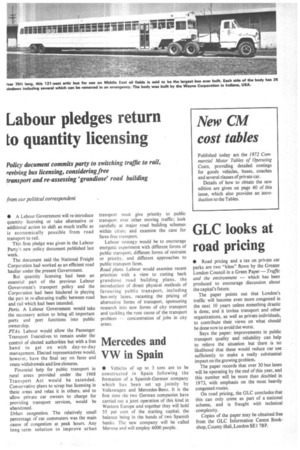Labour pledges return to quantity licensing
Page 19

If you've noticed an error in this article please click here to report it so we can fix it.
Policy document commits party to switching traffic to rail, reviving bus licensing, considering free
transport and re-assessing 'grandiose' road building
from our political correspondent
• A Labour Government will re-introduce quantity licensing or take alternative or additional action to shift as much traffic as is economically possible from road transport to rail.
This firm pledge was given in the Labour Party's new policy document published last week.
The document said the National Freight Corporation had worked as an efficient road haulier under the present Government.
But quantity licensing had been an essential part of the previous Labour Government's transport policy and the Corporation had been hindered in playing the part in re-allocating traffic between road and rail which had been intended.
Ports. A Labour Government would take the necessary action to bring all important ports and port functions into public ownership.
PTAs. Labour would allow the Passenger Transport Executives to remain under the control of elected authorities but with a free hand to get on with day-to-day management. Elected representatives would, however, have the final say on fares and route withdrawals and line closures.
Financial help for public transport in rural areas provided under the 1968 Transport Act would be extended. Conservative plans to scrap bus licensing in these areas and relax it in others, and to allow private car owners to charge for providing transport services, would be abandoned.
Urban congestion. The relatively small percentage of car commuters was the main cause of congestion at peak hours. Any long term solution to improve urban
transport must give priority to public transport over other moving traffic; look carefully at major road building schemes within cities; and examine the case for fares-free transport.
Labour strategy would be to encourage energetic experiment with different forms of public transport, different forms of restraint or priority, and different approaches to public transport fares.
Road plans. Labour would examine recent priorities with a view to cutting back grandiose road building plans, the introduction of direct physical methods of favouring public transport, including bus-only lanes, recasting the pricing of alternative forms of transport, sponsoring research into new forms of city transport and tackling the root cause of the transport problem concentration of jobs in city areas.






























































































